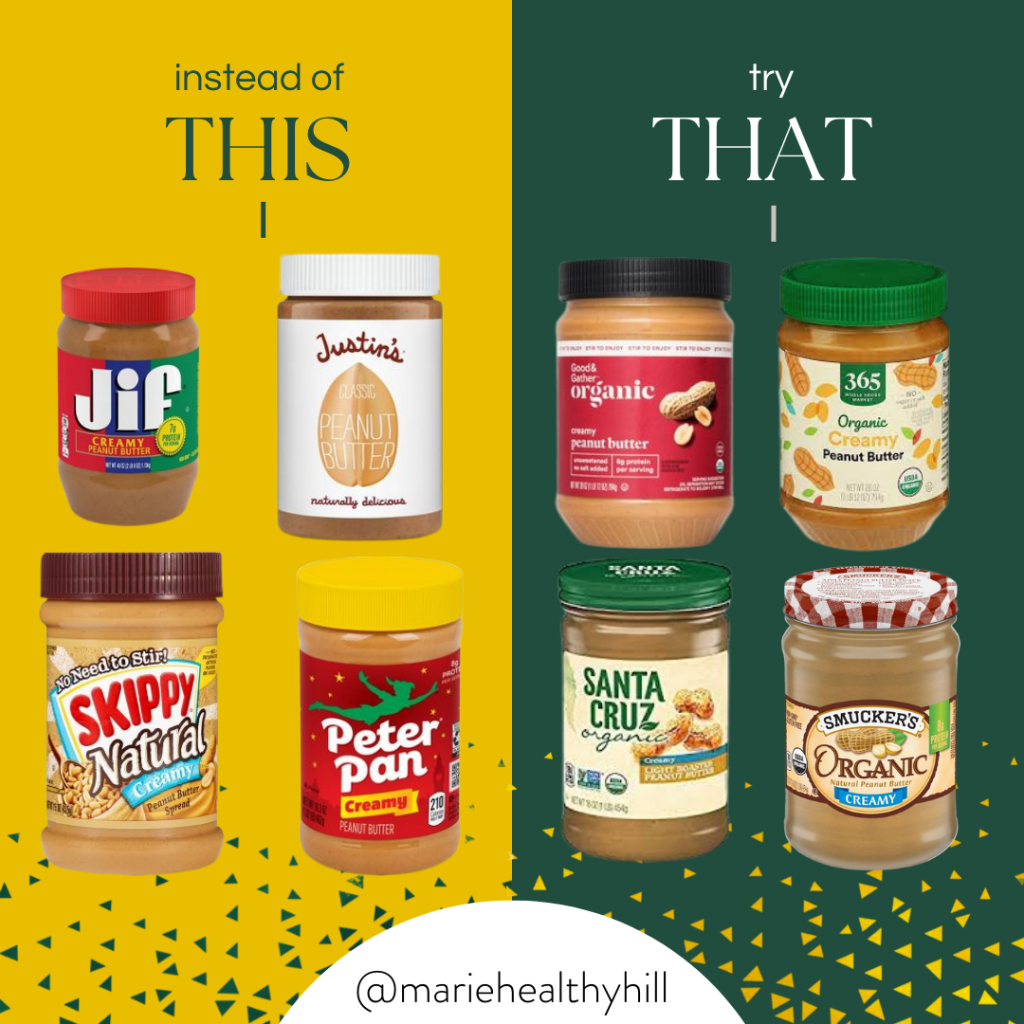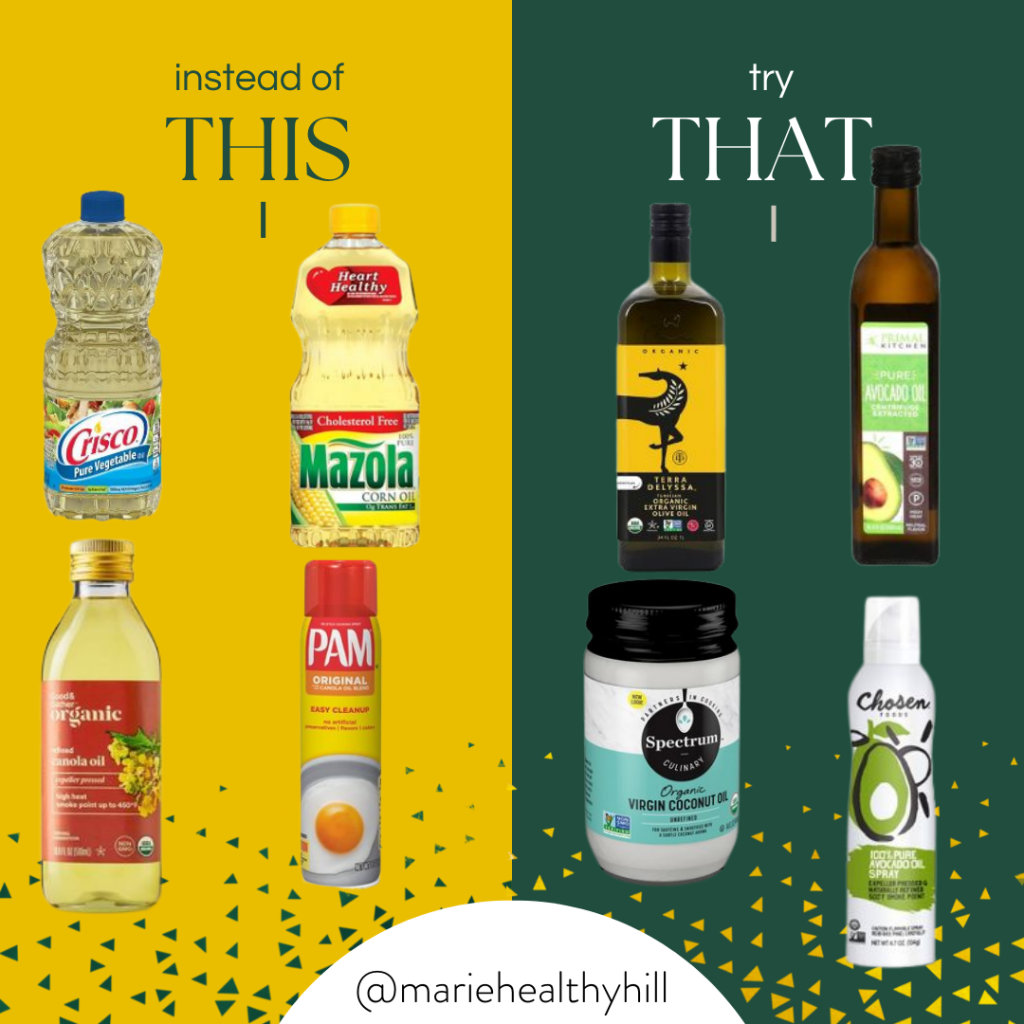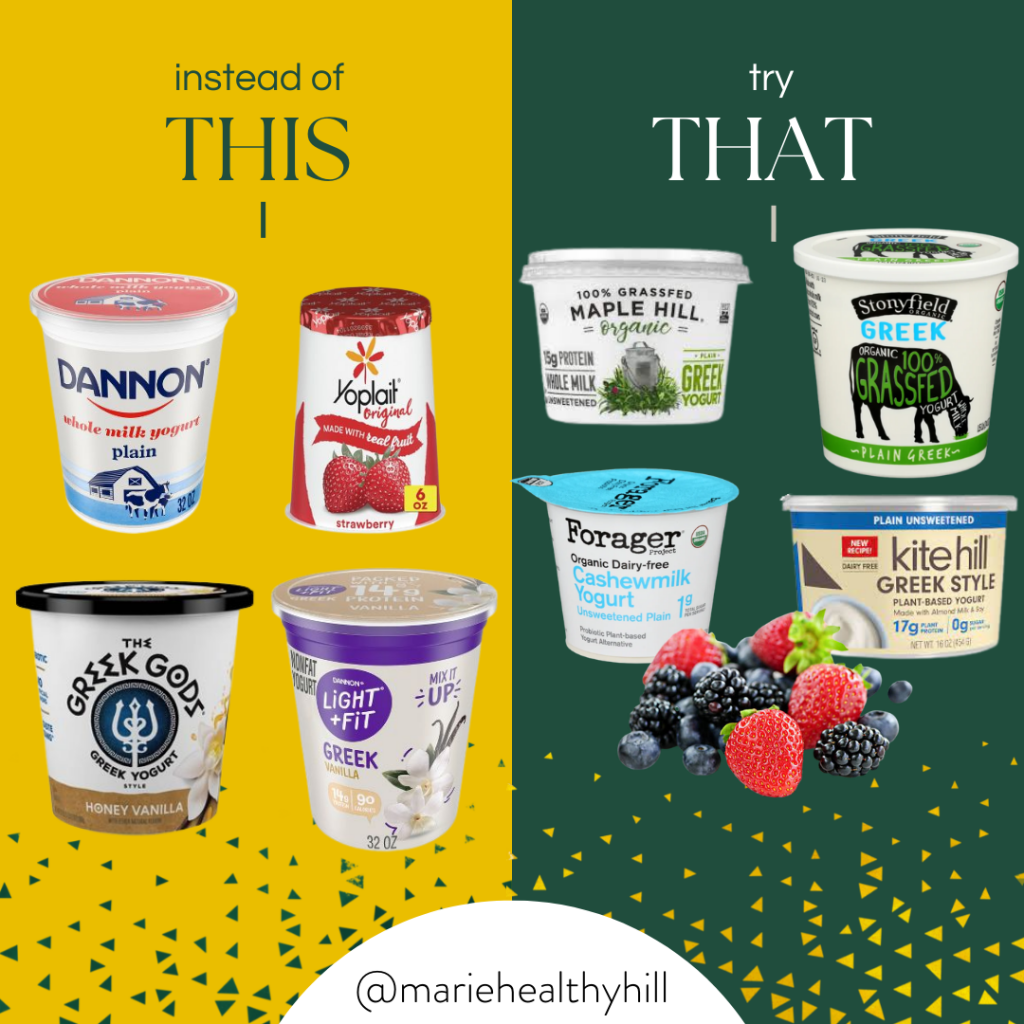Time To Swap
Every week or every other week you add your “staples” to your grocery cart. Here are some easy changes you didn’t know you needed in your life.
I think it is time to “break up” with some of your staples and level up to something better for you and your household, long term! I completely know it is unrealistic to expect someone to trash all their food and pantry items and do a full 360 at one time. In this post I focus on just a few items to get the ball rolling.
Many people consider what they use is healthy without being aware of the hidden ingredients and chemicals sabotaging their efforts. I’m here to guide you and bring awareness. At one point I didn’t know any of this and appreciated those before me that made this more well known.
What your food eats, YOU eat. Even if you are plant based, the vegetables, legumes and fruits all comes from trees, bushes or deep soil. If those are sprayed with chemicals or the soil is treated then you guessed it, it will end up in your food and in your body.
Even if you only swap out one thing, small changes add up! Since I am focusing on peanut butter, oils & yogurt let’s get right to it! Don’t worry a deeper dive of more Pantry/Friday Staples will be coming soon, just didn’t want to overwhelm, I have a tendency to get really detailed.
The Peanut, is it a nut or legume?
Peanuts grow underground in pods and are NOT a nut, they are a legume. Since they are soil dwellers they absorb more of whatever is in the soil at a higher concentration to thrive . Conventional peanuts are known to be heavily treated with synthetic pesticides and fungicides. Ever heard of Roundup? The well known weed killer? It contains the controversial Glyphosate herbicide which is known to cause cancer yet there are articles that say otherwise. This herbicide is found in many conventional peanuts and residues of this have been found in common popular peanut butter brands.
When there is conflicting information on chemicals, read what both sides say, who conducted the studies and are the studies independant or sponsored. Make an educated decision of what aligns for you and your household.
Peanut allergies are extremely common and thank goodness for other nut and seed butters in the market! Most other nuts such as almond, walnuts and hazelnuts grown on trees. Cashews, pistachios are actually seeds. The same applies to these nuts and seeds, what they eat, WE eat!
Choose Certified Organic
When it comes to any Peanut, Nut or Seed Butter choose Certified Organic, when available. Almost any major grocery store here in the Dallas/Ft. Worth area has options. I’ve even ordered some online. Some can be expensive and some under $5.
K.I.S.S. —- Keep It Super Simple —-
There should minimal ingredients in your Peanut, Nut or Seed Butter. It should state the peanut, nut(s) or seed(s), maybe salt and that is it.Even if it says “Certified Organic”, read the ingredient list as some filler oils are snuck in. These fillers oils are used for thickness, spreadability, preservation for no refrigeration and a long shelf life.
Common hidden sabotagers to look for are:
- hydrogenated oils
- soybean oil (what most vegetable oils are made of)
- palm oil (other names- palm kernel oil, palm fruit oil )
What is hydrogenated oil? It is a type of fat that food manufacturers use to keep foods fresher for longer. Hydrogenated oil is bad for you because it contains a high level of trans fats, that increase health risks of developing heart disease and other health problems.
What is vegetable oil? It is made from soybeans. It is called vegetable oil instead of soybean oil mainly as a marketing decision, though it also allows manufacturers to blend other oils, like corn oil, with the soybean oil without having to alter the labels.
Whenever a box mix of almost any baked good calls for vegetable oil, do know you have options in what can be used such as coconut oil, avocado oil or even olive oil.
Dog Treat: Anything Peanut Butter
While Peanuts are the only nut/seed a dog should consume there is more to just giving your pup any kind of PB. Most canine companions love a good Peanut Butter Kong! Keeping it pure and simple is not only good for you but for your dogs too!
Their bodies metabolize everything different than us. Chemicals don’t belong in their system especially the sugar substitute Xylitol. Commonly found in sugar free candies, some peanut butter brands, baked goods, chewing gum and toothpaste. It can be life threatening if ingested.
Read the ingredient for you and especially for your bestie on four paws.

Time to Shop: Peanut Butter
Look for a brand that has……..
- Simple real food ingredients
- Certified Organic
- Brands suggestions: Organic Good Gather Co, Organic 365, Organic Santa Cruz, Organic Smuckers, Artisana (not shown), Once Again (not shown), Spread the Love (not shown)

How to Choose & Use Oils
From high heat to no heat, a variety of differents oils can be used when cooking. Not all oils are the same and despite mass marketing efforts on labels and conflicting science backed research not all are good for your health long term.
It very misleading to see “heart healthy” on products based on industry-funded research. Most of these popular oils such as vegetable, soybean and canola are heavily processed as well as come from GMO crops. Some of these have Omega-6 fatty acids yet at such a high level. Too much of a good thing can be bad, too much of this fatty acid can increase risks of inflammation, autoimmune diseases, heart related disease and even cancer.
What is GMO?
Genetically Modified Organisms are foods that have been modified using genetic techniques. Most foods in your local supermarket contain GMO ingredients because they’re easier and more cost-effective for farmers, which makes them cheaper for the consumer. It is known that the main concerns about adverse effects of GM foods on health are the transfer of antibiotic resistance, toxicity and allergenicity. The use of genetic engineering, or genetically modified organisms (GMOs), is prohibited in organic products.
Most chain grocery stores and even Amazon carry alternate oil options at various price points. Today I’m focusing on 3 Alternates- Avocado, Coconut and Extra Virgin Olive Oil.
Benefits:
Avocado oil: Rich in unsaturated fatty acids, which are linked with better heart health. 70% of avocado oil consists of heart-healthy oleic acid, a monounsaturated omega-9 fatty acid. Is a good source of lutein, which the human body doesn’t produce, that contributes to eye health. Combining fruits and vegetables with avocado in whole or oil form assist in allowing body to absorb valuable nutrients such as fat-soluble vitamins A, D, E, and K.
Coconut oil: Made up of MCT (medium-chain triglycerides), has antimicrobial and antifungal properties due to its MCT content and is a good source of antioxidants. There’s conflicting evidence on the benefits of coconut oil for heart health. Be sure to consume it in moderation. Health authorities advise keeping your intake moderate to avoid increasing your risk of heart disease.
Extra Virgin Olive Oil: rich in monounsaturated oleic acid, contains modest amounts of vitamin E and K, loaded with antioxidants, fight inflammation and help protect your blood cholesterol from oxidation — two benefits that may lower your risk of heart disease.
Time to Shop: Oils
Look for these types, Certified Organic (when/if available)….
- Avocado Oil– good for sautéing, roasting, searing, grilling, and drizzling, any high heat cooking, smoke point 520° F. Mild, buttery flavor works well in both sweet and savory recipes.
- Unrefined Coconut Oil– good for baking, medium/high sauteing, smoke point is 350° F, will have strong coconut flavor due to being minimally processed.
- Refined Coconut Oil– good for frying, high temp cooking, smoke point is 400°F, will have mild to no coconut flavor or smell.
- Extra Virgin Olive Oil– good for drizzling, roasting, shallow fry, mediu sauteing, a smoke point of about 350° F. Look for packaging in dark glass bottles, harvest date (avoid if there is an “expiration date”, and it should smell and taste green, bright, peppery, earthy, grassy, or any combination.
- Spray Oils: any of these oils are available in spray versions
- Brand suggestions: Avocado-Primal Kitchen, Chosen Foods (shown in spray version), Coconut– Spectrum, Chosen Foods (not shown) , Extra Virgin Olive Oil– Terra Delssya, Colavita (not shown), California Ranch (not shown), Lucini (not shown)

Guide to Yogurt
- Choose certified organic: whether diary or not, added hormones don’t belong in you food at any stage
- Choose grass-fed (if available): as mentioned above what your food eats you eat.
- Choose plain and unsweetened: dairy yogurt contains lactose (naturally ocurring sugar), sweetened version have anywhere from 8-29g per serving ( ex. a whole kit kat bar is 20g)
- Choose to read the ingredient list: should be simple minimal real food ingredients, search and avoid added fillers, thickeners (ex. gums), even if the labels says ZERO sugars read for hidden processed names that trick you brain which can cause us to eat more, have a harder time digesting the real sugars that our bodies need (ex. high-fructose corn syrup, dextrose, sucrose, fructose, glucose).
Time to Shop: Yogurt
- Plain Unsweetened Dairy: Maple Hill, Stoneyfield, Nancy’s (not shown), Alexandre (not shown)
- Plain Unsweetened Non-Dairy: Kitehill, Forager, Culina (not shown), Harmless Harvest (not shown)
- Add small amount of fresh fruit (organic if available), dash of cinnamon to any of these for added flavor. The fiber and sugar from the real fruit plus the protein of the yogurt balance out for a filling snack that won’t spike your sugar levels.
